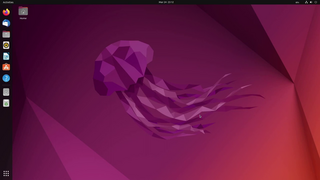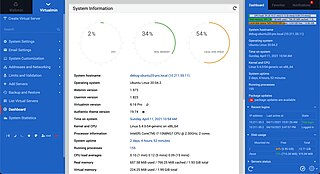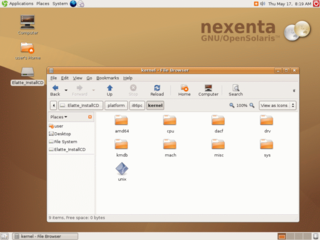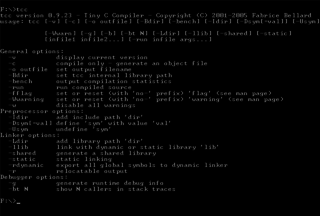
A Linux distribution is an operating system made from a software collection that includes the Linux kernel and, often, a package management system. Linux users usually obtain their operating system by downloading one of the Linux distributions, which are available for a wide variety of systems ranging from embedded devices and personal computers to powerful supercomputers.

PowerPC is a reduced instruction set computer (RISC) instruction set architecture (ISA) created by the 1991 Apple–IBM–Motorola alliance, known as AIM. PowerPC, as an evolving instruction set, has since 2006 been named Power ISA, while the old name lives on as a trademark for some implementations of Power Architecture–based processors.

The GNU C Library, commonly known as glibc, is the GNU Project's implementation of the C standard library. Despite its name, it now also directly supports C++. It was started in the 1980s by the Free Software Foundation (FSF) for the GNU operating system.

Damn Small Linux (DSL) is a discontinued computer operating system for the x86 family of personal computers. It is free and open-source software under the terms of the GNU GPL and other free and open source licenses. It was designed to run graphical user interface applications on older PC hardware, for example, machines with 486 and early Pentium microprocessors and very little random-access memory (RAM). DSL is a Live CD with a size of 50 megabytes (MB). What originally began as an experiment to see how much software could fit in 50 MB eventually became a full Linux distribution. It can be installed on storage media with small capacities, like bootable business cards, USB flash drives, various memory cards, and Zip drives.

MontaVista Software is a company that develops embedded Linux system software, development tools, and related software. Its products are made for other corporations developing embedded systems such as automotive electronics, communications equipment, mobile phones, and other electronic devices and infrastructure.

DokuWiki is a wiki application licensed under GPLv2 and written in the PHP programming language. It works on plain text files and thus does not need a database. Its syntax is similar to the one used by MediaWiki. It is often recommended as a more lightweight, easier to customize alternative to MediaWiki. The 'Doku' in DokuWiki is short for Dokumentation which in German means documentation.
HFS Plus or HFS+ is a journaling file system developed by Apple Inc. It replaced the Hierarchical File System (HFS) as the primary file system of Apple computers with the 1998 release of Mac OS 8.1. HFS+ continued as the primary Mac OS X file system until it was itself replaced with the Apple File System (APFS), released with macOS High Sierra in 2017. HFS+ is also one of the formats used by the iPod digital music player.
Operating systems based on the Linux kernel are used in embedded systems such as consumer electronics, in-vehicle infotainment (IVI), networking equipment, machine control, industrial automation, navigation equipment, spacecraft flight software, and medical instruments in general.

Webmin is a powerful and flexible web-based server management control panel for Unix-like systems. Webmin allows the user to configure operating system internals, such as users, disk quotas, services or configuration files, as well as modify and control open-source apps, such as the Apache HTTP Server, PHP or MySQL.

LAMP is an acronym denoting one of the most common software stacks for many of the web's most popular applications. However, LAMP now refers to a generic software stack model and its components are largely interchangeable.

Nexenta OS, officially known as the Nexenta Core Platform, is a discontinued computer operating system based on OpenSolaris and Ubuntu that runs on IA-32- and x86-64-based systems. It emerged in fall 2005, after Sun Microsystems started the OpenSolaris project in June of that year. Nexenta Systems, Inc. initiated the project and sponsored its development. Nexenta OS version 1.0 was released in February 2008.

The Tiny C Compiler is an x86, X86-64 and ARM processor C compiler initially written by Fabrice Bellard. It is designed to work for slow computers with little disk space. Windows operating system support was added in version 0.9.23. TCC is distributed under the GNU Lesser General Public License.

Linux is a family of open-source Unix-like operating systems based on the Linux kernel, an operating system kernel first released on September 17, 1991, by Linus Torvalds. Linux is typically packaged in a Linux distribution.
FastCGI is a binary protocol for interfacing interactive programs with a web server. It is a variation on the earlier Common Gateway Interface (CGI). FastCGI's main aim is to reduce the overhead related to interfacing between web server and CGI programs, allowing a server to handle more web page requests per unit of time.

OpenMediaVault (OMV) is a free Linux distribution designed for network-attached storage (NAS). The project's lead developer is Volker Theile, who instituted it in 2009. OMV is based on the Debian operating system, and is licensed through the GNU General Public License v3.

The Yocto Project is a Linux Foundation collaborative open source project whose goal is to produce tools and processes that enable the creation of Linux distributions for embedded and IoT software that are independent of the underlying architecture of the embedded hardware. The project was announced by the Linux Foundation in 2010 and launched in March, 2011, in collaboration with 22 organizations, including OpenEmbedded.
Excelsior JET is a now-defunct proprietary Java SE technology implementation built around an ahead-of-time (AOT) Java to native code compiler. The compiler transforms the portable Java bytecode into optimized executables for the desired hardware and operating system (OS). Also included are a Java runtime featuring a just-in-time (JIT) compiler for handling classes that were not precompiled for whatever reason, the complete Java SE API implementation licensed from Oracle, and a toolkit to aid deployment of the optimized applications. Excelsior JET is developed by Excelsior LLC, headquartered in Novosibirsk, Russia.
Orthanc is a standalone DICOM server. It is designed to improve the DICOM flows in hospitals and to support research about the automated analysis of medical images. Orthanc lets its users focus on the content of the DICOM files, hiding the complexity of the DICOM format and of the DICOM protocol. It is licensed under the GPLv3.

AlternC is a set of open-source Web Hosting server management software for Linux/UNIX-like systems, whose aim is to promote self hosting by individuals or small structures, and provide its users with an easy web-based interface to manage a web and mail server.













